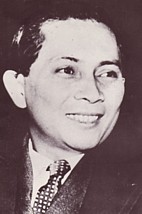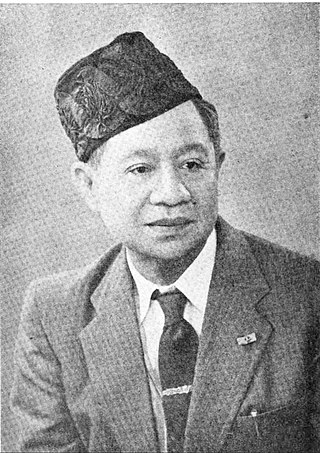
The position of Prime Minister of Indonesia existed from 1945 until 1966. During this period, the prime minister was in charge of the Cabinet of Indonesia, one of the three branches of government along with the People's Representative Council and the president. Following his 1959 decree, President Sukarno assumed the role and powers of prime minister until his resignation in 1966.

Raden Djuanda Kartawidjaja, commonly known as Djuanda Kartawidjaja, usually referred to simply as Djuanda, was an Indonesian politician and ethnic Sundanese noble from the court of Cirebon, who served as the 11th and last Prime Minister of Indonesia. He previously served as Minister of Communications in seven cabinets from 1946 to 1949 and 1950 to 1953; as Minister of State in 1949 and Minister of Welfare from 1949 to 1950. Djuanda was Indonesia's final Prime Minister in the Sukarno "Karya" cabinets, the final cabinets of the Liberal Democracy Era and as First Minister from 1959 until his death in 1963.

The Wilopo Cabinet was an Indonesian cabinet that served from 1 April 1952 until 3 June 1953.

The State of Pasundan was a federal state (negara bagian) formed in the western part of the Indonesian island of Java by the Netherlands in 1948 following the Linggadjati Agreement. It was similar to the geographical area now encompassed by the current provinces of West Java, Banten and Jakarta.

Raden Aria Adipati Wiranatakusumah V, commonly shortened to R. A. A. Wiranatakusumah V or just as Wiranatakusumah V, was an Indonesian politician who served as the first and only Wali Negara of Pasundan, during the Indonesian National Revolution. He was also the first Minister of Home Affairs of Indonesia and the second Chairman of the Supreme Advisory Council.

The Adil Cabinet was the first cabinet established by the State of Pasundan following the formation of the state on 28 April 1948. It was composed of eight ministers and one official. Its term of office ran from 8 May 1948 to 10 January 1949.

The Third Djumhana Cabinet was the fourth cabinet established by the State of Pasundan. It was composed of nine ministers and one official. Its term of office ran from 18 July 1949 to 11 January 1950.

The First Djumhana Cabinet was the second cabinet established by the State of Pasundan. It was composed of nine ministers and one official. Its term of office ran from 10 to 31 January 1949.

The Second Djumhana Cabinet was the third cabinet established by the State of Pasundan. It was composed of eight ministers. Its term of office ran from 31 January to 18 July 1949.

The Prime Minister of Pasundan was the head of government and the highest political office in the short-lived State of Pasundan (1948-1950). Appointed by the Wali Negara of Pasundan from among influential Members of Parliament, the Prime Minister was responsible to the Parliament, and his cabinet could be dismissed by a vote of no confidence.

Oetarjo Anwar Tjokroaminoto was an Indonesian politician and journalist. He served as Minister of Social Affairs for a year in the Wilopo Cabinet, and was the Prime Minister of Pasundan for less than a month during January 1950.

Djumhana Wiriaatmadja was a Sundanese aristocrat, regent, politician, and diplomat.

The Wali Negara of Pasundan was the head of state and highest political office in the short-lived State of Pasundan, which existed as a Dutch-backed federal parliamentary republic from 1948 until the state's dissolution in 1950. According to the Regulations of the Constitutional Organization of Pasundan, the Wali Negara had the authority to dissolve the Parliament, appoint and discharge the Prime Minister, enact decrees, and submit law drafts and the state budget to the Parliament. If the Wali Negara died or resigned prior to the end of the term, the Speaker of the Parliament, who also acted as the Deputy Wali Negara, would have replaced him/her.

The Ministry of Home Affairs was a government ministry of the State of Pasundan. The ministry was responsible for the control of the state apparatus, civil service, and the Pasundan Police Department.

The Ministry of Justice was a government ministry of the State of Pasundan. The ministry was responsible for the justice system, penitentiary system, publishing of government gazette, dactyloscopy, and beachcombing in the State of Pasundan.

The Ministry of Education and Religious Affairs was a government ministry of the State of Pasundan. The ministry was responsible for the schools, university, and religious matters in the State of Pasundan.

The Ministry of Health was a government ministry of the State of Pasundan. The ministry was responsible for the health system, vaccination programs, hospitals, and clinics in the State of Pasundan.

Djerman Prawirawinata was a Sundanese politician who served as the last Minister of State of Pasundan and a member of the People's Representative Council.

Mohammad Enoch was an Indonesian politician and engineer. He briefly served as Minister of Public Works during the First Amir Sjarifuddin Cabinet prior to his resignation, and also briefly as mayor of Yogyakarta before that.
















